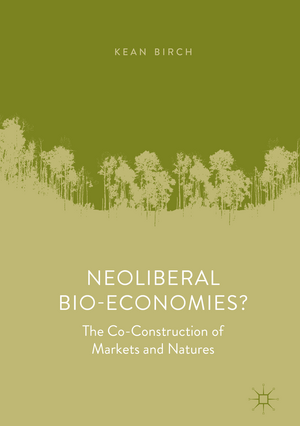Neoliberal Bio-Economies?: The Co-Construction of Markets and Natures
Autor Kean Birchen Limba Engleză Hardback – 18 iul 2018
| Toate formatele și edițiile | Preț | Express |
|---|---|---|
| Paperback (1) | 465.98 lei 6-8 săpt. | |
| Springer International Publishing – 20 dec 2018 | 465.98 lei 6-8 săpt. | |
| Hardback (1) | 474.63 lei 6-8 săpt. | |
| Springer International Publishing – 18 iul 2018 | 474.63 lei 6-8 săpt. |
Preț: 474.63 lei
Preț vechi: 558.39 lei
-15% Nou
Puncte Express: 712
Preț estimativ în valută:
90.82€ • 95.02$ • 75.44£
90.82€ • 95.02$ • 75.44£
Carte tipărită la comandă
Livrare economică 02-16 aprilie
Preluare comenzi: 021 569.72.76
Specificații
ISBN-13: 9783319914237
ISBN-10: 3319914235
Pagini: 202
Ilustrații: XV, 208 p. 9 illus., 2 illus. in color.
Dimensiuni: 148 x 210 mm
Greutate: 0.52 kg
Ediția:1st ed. 2019
Editura: Springer International Publishing
Colecția Palgrave Macmillan
Locul publicării:Cham, Switzerland
ISBN-10: 3319914235
Pagini: 202
Ilustrații: XV, 208 p. 9 illus., 2 illus. in color.
Dimensiuni: 148 x 210 mm
Greutate: 0.52 kg
Ediția:1st ed. 2019
Editura: Springer International Publishing
Colecția Palgrave Macmillan
Locul publicării:Cham, Switzerland
Cuprins
1. Introduction.- 2. Neoliberalism.- 3. Neoliberalism and bio-economies.- 4. Background to emerging bio-economies.- 5. Imagining bio-economies.- 6. Constructing bio-economies.- 7. Legitimating bio-economies.- 8. Limits to bio-economies.- 9. Alternative Bio-economies.- 10. Conclusion.
Recenzii
“This study is outstanding for its erudition and summaries of research into both neoliberalism and the bio-economy. … focal depth Birch offers into the importance of materiality in the co-construction of markets and natures is particularly welcome. … Birch’s study is a salutary compass to find one’s way among the meanderings of the bio-economy and to position it in a wider discussion about the relationships between the economy and the environment, as well as indicating stimulating research avenues to explore.” (Benjamin Raimbault,Review of Agricultural, Food and Environmental Studies, Vol. 102, 2021)
Notă biografică
Kean Birch is a Senior Associate of the Innovation Policy Lab, University of Toronto, Canada.
Textul de pe ultima copertă
In this book, Kean Birch analyses the co-construction of markets and natures in the emerging bio-economy as a policy response to global environmental change. The bio-economy is an economic system characterized by the use of plants and other biological materials rather than fossil fuels to produce energy, chemicals, and societal goods. Over the last decade or so, numerous countries around the world have developed bio-economy strategies as a potential transition pathway to a low-carbon future. Whether this is achievable or not remains an open question, one which this book seeks to answer. In addressing this question, Kean Birch draws on over ten years of research on the bio-economy around the world, but especially in North America. He examines what kinds of markets and natures are being imagined and constructed in the pursuit of the bio-economy, and problematizes the idea that this is being driven by neoliberalism and the neoliberalization of nature(s).
Caracteristici
Distinguishes neoliberalism as key critical trope of contemporary political economy Explores the Bio-economy as a future sustainable society Analyzes markets and natures as co-produced
